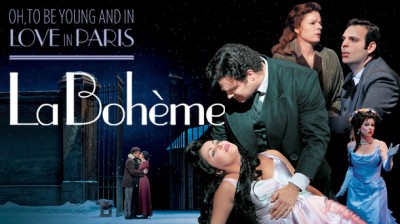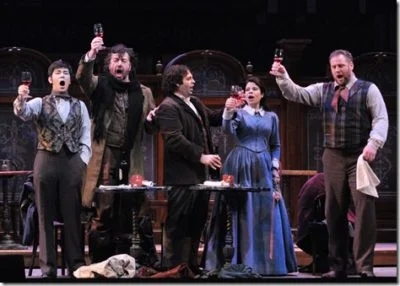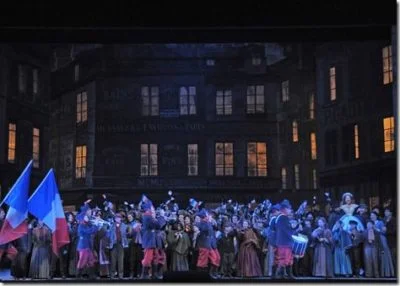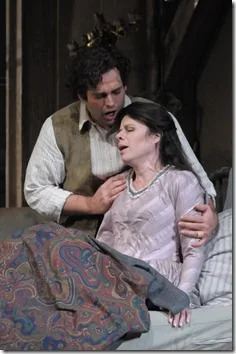La Boheme
Music by Giacomo Puccini
Libretto by Giuseppe Giacosa
Conductor Emmanuel Villaume
Director Louisa Muller
At the Lyric Opera of Chicago
Date Reviewed: January 24, 2013
Popular opera still enchants
Puccini sets the mood for his proverbially adored opera, La Boheme in the very first bars; a pungent, disarming motif outlining the first three pitches of a minor scale in descending order that leads directly into the action without an overture. It is modern, and life affirming, in a jazzy nonchalant sort of way, with a definite tinge of melancholy. It is the world of les Bohemes in Paris, Adolfo, the poet, and his mates Rodolfo a painter, Collin the Philospher, and Schaunard a musician, all vividly depicted in this elegant new production brought over from the San Francisco Opera directed by Louisa Muller, and with sets by Michael Yeargan. Neither Rodolfo nor any of his friends have even money enough to keep wood burning in the stove that heats a small garret apartment. But why not make light of it, sacrifice the chair to the flames, have a mock banquet, and then go out on the town? They are aesthetic idealist paupers, not hermits, and are determined to have life their own way. One of them, in particular, falls deeply in love in Act I with Mimi, a neighbor who has come asking is someone might light her candle in Act I. Adolfo boasts in what is perhaps the greatest aria of the opera Che gelida manina that with such love, and no material comfort, he can be a millionare. And yet it is the great tragedy of La Boheme that Rodolfo necessitous state of living, and headstrong nature, are perhaps what causes him to loose her, with whom he claims even the most trying circumstances become for him a paradise.
The libretto, adapted from Henri Merger’s Scene de la vie de Boheme by Puccini’s usual collaborators Giuseppe Giacosa and Luigi Illica is certainly quite engaging, especially by operatic standards. The music is at once representational, more in the French tradition, in the sense of bringing out the emotional quality of individual moments in a way certainly German opera never quite tried to do, and yet maintain an Italinate richness of melody, and warmth; and a characteristically modern sense of sweep and concision. All of this can certainly be enjoyed in La Boehme, although is un-deniable that the more powerful moments of the opera are also the most intimate. Indeed, Puccini himself seems to have recognized this, and it was perhaps deliberate on his part to write two of his most beloved subsequent operas Tosca and Madama Butterfly almost entirely in duets. The prolonged duet of Rodolfo and Mimi’s first meeting, and again the tragic close, set in the same under-furnished garret apartment, are essentially what makes this opera worth seeing. Undeniably, this is also due, in part, to the exquisite singing of Dimitri Pittas as Rodolfo in the January and Febuary performances of La Boheme. And although one gets the impression that Ana Maria Martinez as Mimi enters in act one mistakenly assuming herself to be playing a matronly godless in Wagner’s The Ring Cycle, she comes around by Acts III and IV to give, in fact, a very tender, if not the most arresting of performances. At times in Act I it seemed as if Pittas was the only one of his cohort to be heard over the orchestra; his voice is also by far the sweetest of the bunch, with a great deal of pathos. In the higher range Pittas is perhaps not as confident as he might be, but the sound that comes out is never un-attractive. Lucas Meachem as Marcello and especially Joseph Lim as Schaunard fell rather flat. And surprisingly enough, so does Elizabeth Futral as Musetta in the normally ravishing Act II waltz.
Yet, French-conductor Emmanuel Villaume’ superb direction of the Lyric Opera Orchestra, which he also lead with marked success in last seasons’ Les Contes d’Hoffman is reason enough to see this production of La Boheme. Never have I heard the multi-faceted delights of Puccini’s writing so convincingly displayed; and indeed I strongly doubt if I have ever heard the Lyric Opera Orchestra sound better. It is a characteristic flaw in this otherwise fine ensemble that they take twenty minutes or so to warm up. The only other time I recall their sounding this poised from the beginning was last year when Villaume was also on the podium. If Lyric is thinking of hiring a new music director they have found their man.
Recommended
Gabriel Kalcheim
At the Lyric Opera of Chicago, 20 N Wacker Dr, Chicago, IL , (312) 332-2244, https://www.lyricopera.org/, tickets $64 – $224, running time 2 hours, 21 minutes with one intermission, through March 28, 2013




